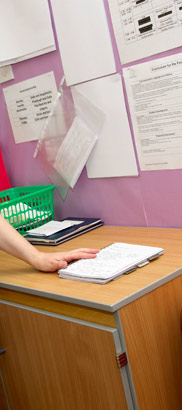
The Ofsted framework for school inspection (January 2012) poses additional and different evaluative questions for special
schools providing for pupils with complex needs or for similar pupils located in attached resource bases in mainstream schools.
Judgements will be made in four areas:
- Achievement
- Teaching
- Behaviour
- Leadership and management (including social, moral, spiritual and cultural development)
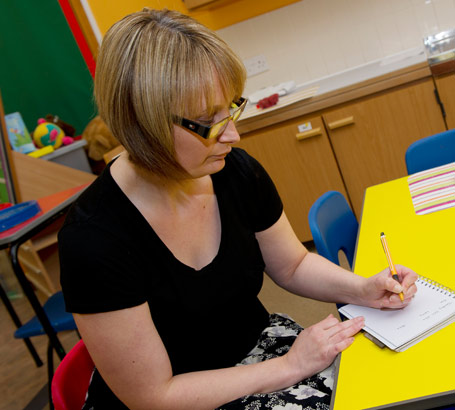
Four graded judgements will contribute to an overarching judgement about the effectiveness of a school.
The following screens contain some questions from the new framework for school inspection that are relevant to the task of
planning for a senior school leader.
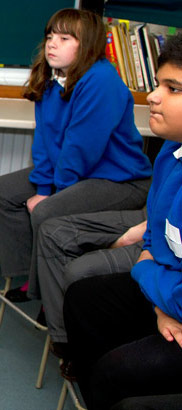
Have you:
- Evaluated the rigour of the moderation process against p-scales (minimum school, other schools, local authority, regional)?
- Considered pupil's ages and starting points when measuring progress and determining targets? (Progression Materials 2010-2011)
- Understood and ensured members of staff understand the difference between achievement, attainment and progress? Do all members of staff know what constitutes inadequate, satisfactory, good and outstanding progress for individual pupils? Can they provide an evidence trail to substantiate the judgement?
- Evaluated the impact on pupils' progress of those receiving specialist support or who are having particular interventions?
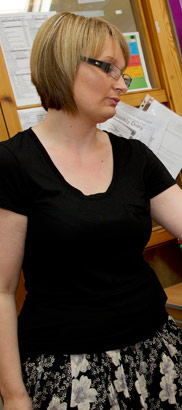
Have you:
- Maintained high expectations of pupils through self-reflection and lesson observations?
- Checked that individual and group targets have sufficient ambition and have taken into account the Progression Materials 2010-2011?
- Recognised that it is difficult to evaluate the degree of challenge in individual education plan targets (or whatever name you use) unless they are effectively linked to moderated expectations (using same age / same starting point and the Progression Materials 2010-2011)?
You may not have realised that while reviewing and reporting progress against objectives in the Statement of Special Educational Needs is required, there is no statutory requirement for pupils to have individual education plans. It may be repetitive and unnecessary to have IEPs if target setting processes are secure.
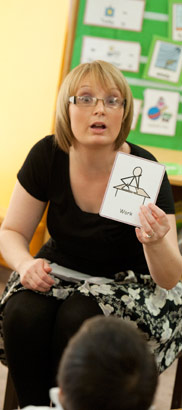
Have you:
- Paid sufficient attention to promoting independent learning in newly acquired skills? (Remember the grade descriptor for inadequate learning and progress includes the phrase 'too many pupils fail to work effectively unless closely supervised by an adult' – this applies to those with complex difficulties as well as those in mainstream school.)
- Ensured that at 16 – 19 the indicator for good progress is not the amount of accreditation courses completed, but the distance travelled through Key Stages 3 to 4 and Key Stages 4 to 5?
- Completed an analysis of the outcomes of different groups in your school? Even with small cohorts this is an important task and can often pick up areas of the curriculum where underperformance becomes obvious across gender, minority ethnic and other groups. (Refer to Page 5 of the Evaluation Schedule.)
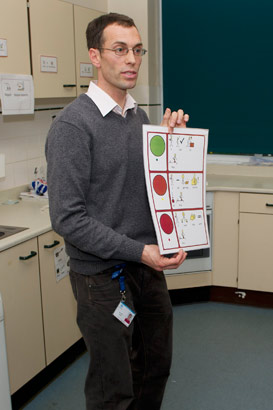
Have you:
- Challenged the assumption that additional adult support will always improve a pupil's progress?
- Investigated thoroughly if pupils have sufficient opportunity to interact with others where appropriate or whether adults inappropriately lead the majority of interactions?
- Established whether pupils are learning or simply being occupied?
- Evaluated how well teaching engages, enthuses and motivates pupils?
- Evaluated whether the pace of a lesson (whole class/group work) impedes the progress of individual pupils?
Expectations/challenge (2)
Consider the following:
- Checked that all staff are clear about the learning intentions – not just about subject content, but particular skills that are more general than the area of learning being covered?
- Challenged assumptions that pupils with certain needs are unable to take part in some activities – for example, learning together, working alongside etc?
- Ensured that augmentative communication, when used to communicate to groups and individuals, is of a high and consistent quality across all staff?
- Is it the most effective strategy? Are the outcomes consistently evaluated and modifications undertaken in relation to improving outcomes?
- Checked that parents/carers fully informed of how jointly they can support specific learning intentions?
- Issued guidelines about homework which has been developed in consultation with parents/carers? Is there an expectation on pupils as they move up in a school to be involved in additional work at home?
of learning
Have you:
- Checked that all teaching consistently reinforces and extends a pupil's knowledge and understanding by putting the development of communication skills at the heart of the learning process?
- Ensured that the language of numeracy reinforced across all areas of the curriculum?
- Evidence to show that the range of teaching and learning strategies used across the school sufficient, relevant and interactive enough to
ensure pupils are engaged and enjoy their learning?
- Collected information about the extent of pupils' enjoyment? What actions have you taken to respond to what you know?
- Regularly collected all pupils and parents' views, through relevant means, to regularly inform you of pupils' enjoyment?
- Made use of the views – have you tangible evidence of a response to information you receive?